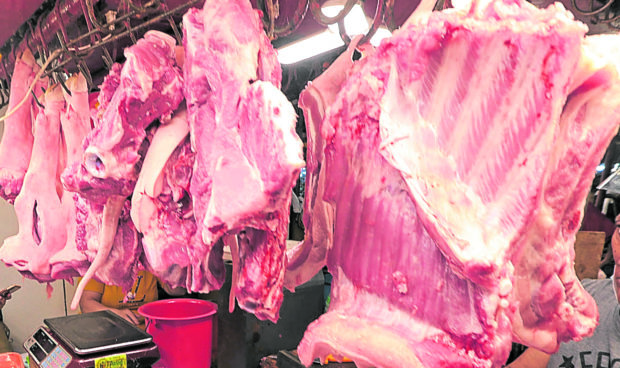
Pork displayed in a market. (File photo by GRIG C. MONTEGRANDE / Philippine Daily Inquirer)
MANILA, Philippines — The Philippines is expected to continue sourcing more pork from abroad following the Marcos administration’s decision to extend the validity of lower import tariffs until the end of the year, according to the US Department of Agriculture (USDA).
In a report, the USDA predicts the country would import 600,000 metric tons (MT) of pork this year, an increase of 4.3 percent. The USDA had raised the 2022 pork import estimates to 575,000 MT on the back of “stronger than expected trade data.”
Executive Order No. 10, signed by President Ferdinand Marcos Jr. in December last year, retained the most favored nation rates on fresh, chilled, or frozen meat at 15 percent (in-quota) and 25 percent (out-quota) effective until end-2023.
Based on data from the Bureau of Animal Industry, the country’s total meat imports climbed by 16.4 percent to 1.35 billion kilograms in 2022, with pork imports as the main driver.
The foreign agency likewise sees the domestic industry producing 1 million MT this year with bigger pigs. The number will surpass 2022 pork production, which is estimated to reach just 925,000 MT due to the resurgence of African swine fever (ASF) cases in Luzon and Mindanao.
“The industry sees a glimmer of hope because of the special permit application for an ASF vaccine by a local company [in partnership with a Vietnamese company] before the Food and Drug Administration (FDA),” the report said.
Last year, KPP Powers Commodities Inc. struck an agreement with Vietnamese firm AVAC Vietnam Joint Stock Co. to become the exclusive distributor of the latter’s ASF Live Vaccine.
Pending the FDA’s approval, the USDA assumes “the current situation of no vaccine will persist.”
“Recently, there were ASF outbreaks in Iloilo province, dealing a big blow to the supply for Metro Manila,” the USDA said.
Still, pork consumption is seen to hit 1.599 million because of the influx of imported pork.
“Filipinos are generally pork-eaters and becoming price-conscious also. The entry of cheaper imported pork will boost consumption,” it added.
Pork kasim retails for P330 per kilogram, up from P270/kg the previous week, based on the Department of Agriculture’s price monitoring as of last Friday. Pork liempo’s selling price, meanwhile, decreased to P300 per kilogram from P380 per kilogram.
The USDA likewise raised its local chicken meat production forecast to 1.36 million MT from 1.3 million MT previously on the back of a growing economy.
Free of bird flu
“With the egg industry taking a big hit from HPAI (highly pathogenic avian influenza), chicken is the next available less expensive protein source,” the report said.
So far, the provinces of Rizal, Camarines Sur, Davao del Sur and Bataan have been declared free of bird flu.
“Poultry integrators and commercial raisers, however, are wary of big-time expansion because of the HPAI threat and the usual high cost of feed ingredients,” it added.
United Broiler Raisers Association chair Gregorio San Diego said earlier the domestic industry was adversely affected by the global bird flu outbreak and the rising cost of producing eggs.
The price of feed, accounting for almost P5 of an egg’s selling price, climbed to P34 per kilogram from just P19 to P20 per kilogram in recent years.
“Eggs on a tray basis (30 eggs in a tray) are already more expensive than a kilogram of dressed chicken, which will lead to a shift in consumption,” the USDA noted.
As of writing, medium-sized eggs are sold for P7 to P9 apiece from only P5 to P6.50 apiece. A tray of egg costs P270, much higher than the price of whole chicken at P180 to P220 per kilogram.
“The decline in egg production because of HPAI will incentivize broiler producers to increase production since broiler meat is an alternative source of less expensive protein,” it added.